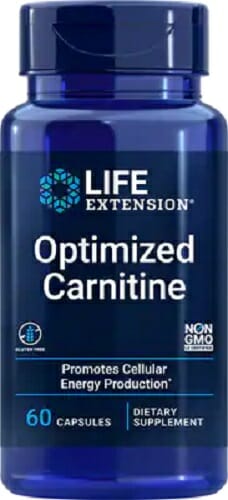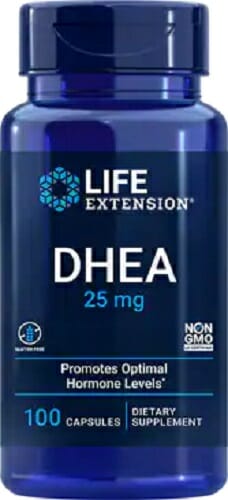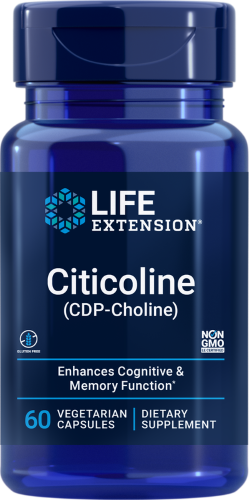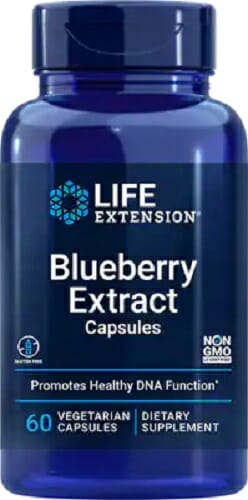Description
A major cause of aging is a reduction in the energy-producing components of the cell, resulting in reduced cellular metabolic activity, and the accumulation of cellular debris.1-7 L-carnitine helps maintain cellular energy metabolism by assisting in the transport of fatty acids from the cytosol into the mitochondria within the cell, where fats are oxidized to produce the cellular energy.8-13
Acetyl-L-carnitine is the acetylated ester of the amino acid L-carnitine. Acetyl-L-carnitine is an endogenous mitochondrial membrane compound that helps maintain mitochondrial bioenergetics and lowers the increased oxidative stress associated with aging.14 Acetyl-L-carnitine and L-carnitine are absorbed into the bloodstream efficiently. Both are effective at carrying long-chain fatty acids across the membrane into the mitochondria where they are burned for energy production and utilized efficiently by the cells.15-18 Acetyl-L-carnitine also guards against oxidative damage.5,19-21 Amyloid-beta peptide is a principal component of plaques and is thought to be a contributor to the aging process. Acetyl-L-carnitine exerts protective effects against such neurotoxicity and oxidative stress.14
Optimized Carnitine combines three advanced forms of carnitine in one single formula to help you optimize energy output:
- Acetyl-L-carnitine crosses the blood-brain barrier to combat oxidative stress and promote energy production in brain and central nervous system tissues.22 It also supports the release and synthesis of acetylcholine, enhances the release of dopamine from neurons and helps it bind to dopamine receptors.
- Acetyl-L-carnitine arginate dihydrochloride is a patented form of acetyl-L-carnitine. Cell studies suggest that it promotes the growth of neurites that facilitate communication among nerve cells in the brain.23
- Glycine propionyl-L-carnitine is molecularly bonded to glycine, one of the precursor amino acids to carnitine biosynthesis. This form offers such benefits as enhanced fatty acid metabolism, antioxidant activity and increased nitric oxide production. In addition, Glycine propionyl-L-carnitine promotes optimal blood flow and combats muscle fatigue by increasing energy and sparing glycogen stores.24
These optimized forms of carnitine help transport fatty acids right to the heart of your energy-producing mitochondria. And that boost in cellular function can help you produce cellular energy faster, for a quicker recovery after exercise and less muscle fatigue during exercise.25,26 It may also benefit your brain, heart, and central nervous system right along with your muscles.
Supplement Facts
| Serving Size: 2 vegetarian capsules Servings Per Container: 30 | |
| Amount Per Serving | |
| Acetyl L-Carnitine HCl | 800 mg |
| Acetyl L-Carnitine Arginate Di-HCl | 300 mg |
| Glycine Propionyl L-Carnitine HCl | 300 mg |
| Other Ingredients: vegetable cellulose (capsule), dicalcium phosphate, stearic acid, silica. | |
Dosage and Use:
- Take two capsules once or twice daily, or as recommended by a healthcare practitioner.
- This product can be taken on an empty stomach with water or juice in the morning in divided doses or all at once.
Caution: For some people, L-carnitine, especially acetyl-L-carnitine, may have a stimulating effect. Therefore, it may be unwise to take it in the evening.
Warnings:
- If pregnant, nursing, or taking medication, consult your physician before taking this product
- Keep out of reach of children
- Do not exceed recommended dose
References:
1. Physiol Rev.1998 Apr;78(2):547-81.
2. Ann N Y Acad Sci. 2004 Jun;1019:406-11.
3. Age. 1983 6:86-94.
4. Exp Gerontol. 1984;19(1):31-6.
5. Proc Natl Acad Sci U S A. 1994 Nov 8;91(23):10771-8.
6. Proc Natl Acad Sci U S A. 1997 Apr 1;94(7):3064-9.
7. Ann N Y Acad Sci. 1998 Nov 20;854:118-27.
8. Brain Res. 1990 Aug 27;526(1):108-12.
9. Metabolism. 1997 Dec;46(12):1454-7.
10 Mech Ageing Dev. 1995 Oct 13;84(2):103-12.
11. Ann N Y Acad Sci. 2002 Apr;959:491-507.
12. Physiol Rev. 1983 Oct;63(4):1420-80.
13. Am J Clin Nutr. 2007 Dec;86(6):1738-44.
14. J Neurosci Res. 2006 Aug 1;84(2):398-408.
15. Acta Diabetol. 2003 Oct;40 Suppl 1:S106-13.
16. Biochim Biophys Acta. 2000 Jun 26;1486(1):1-17.
17. J Clin Invest. 1989 Oct;84(4):1167-73.
18. Exp Physiol. 2008 Oct;93(10):1139-46.
19. Neurochem Res. 2009 Apr;34(4):755-63.
20. Ann N Y Acad Sci. 2004 Nov;1033:117-31.
21. Proc Natl Acad Sci U S A. 2002 Feb 19;99(4):1876-81.Erratum in: Proc Natl Acad Sci U S A 2002 May 14;99(10):7184.
22. J Neurochem. 2010 Aug;114(3):820-31.
23. Neurochem Res.1995 Jan;20(1):1-9.
24. J Int Soc Sports Nutr. 2009 Apr 2;6:9.
25. Int J Sport Nutr Exerc Metab.2008 Feb;18(1):19-36.
26. Med Sci Sports Exerc. 2001 Sep;33(9):1415-22.
27. Effect of oral acetyl L-carnitine arginate on resting and postprandial blood biomarkers in pre-diabetics
28. Office of Dietary Supplements: Carnitine
* These statements have not been evaluated by the Food and Drug Administration. This Product is not intended to diagnose, treat, cure or prevent any disease.







Reviews
There are no reviews yet.